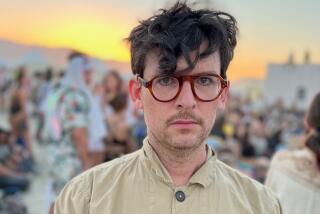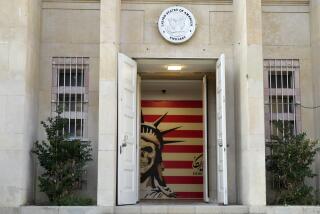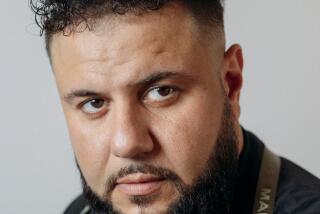Popular Egypt TV religious figure raises his sights
His 2.6 million fans on Facebook make him one of the site’s 75 most popular people. His television show borrows from Donald Trump’s. When he appears before thousands of adoring fans, he wears Hugo Boss suits and applies a little black makeup to his scalp to hide the gaps in his thinning hair.
Amr Khaled is the Arab world’s most successful televangelist, a charismatic guide for millions of Muslims.
His TV programs, audiotapes and DVDs have long been ubiquitous. Now, Egyptians are seeing him in the flesh once again after his return from eight years of exile in Britain.
At the Cairo Opera House the other day, spotlights shone down on Khaled in spinning, kaleidoscopic patterns of light. The sound system vibrated with gentle, liquid beats. An impossibly thin woman wearing pinstripes and fake eyelashes stood at the glass lectern, reading his introduction.
The hall was filled with hundreds of young middle-class strivers, his core following. Egypt’s revolution had lifted the yoke of hopelessness and apathy, and he had more good news for them: Vodafone was giving millions of dollars to the volunteer arm of his ministry to increase literacy in southern Egypt.
Poverty and illiteracy, he is fond of saying, have made Arabs “parasites.” He urged his audience to focus on economic development as the gateway to political ends. After all, the prophet Muhammad was a successful merchant.
“Let’s dream again,” he told the crowd, gazing into audience members’ eyes as if they were sharing an enchanted moment.
It was another step in Khaled’s careful reentry. He went into exile after then-President Hosni Mubarak’s regime banned him from appearing in public. His independent voice was viewed as a threat to the popularity of state-sanctioned religious figures. In Birmingham, England, he was a favorite of Westerners who saw him as a counterweight to Islamic extremism.
Khaled came home at the end of January, as demonstrations convulsed the country.
Now, he’s not just filling Egyptian stadiums. He’s cautiously testing the waters for a new political party or even a run for the presidency.
Message boards on his website buzz with fans urging him to run.
But after stepping off the opera house stage, Khaled, 43, was noncommittal in responding to a question about his political intentions.
“We need to wait and see,” he said. “It’s too early.”
Khaled’s spiritual home is an immaculate mosque in 6th of October City, one of Cairo’s new suburbs, where the prosperous escape the overcrowded city at the end of a desert highway lined with a Starbucks, a Chili’s Grill & Bar and billboards touting homes in new subdivisions.
The mosque — a gleaming white structure with a soaring ceiling and colossal chandelier — is conservative but forward-looking. Women are urged to wear the veil and are advised to follow their husbands’ advice when it comes to work, but Khaled focuses on women’s central role in Islamic history and denounces so-called honor killings, in which male relatives kill women accused of promiscuity.
Banners in the mosque celebrate a future Palestinian state, and a “free Jerusalem” is an often-expressed dream, but Khaled says this will be achieved through economic development at home, and without any violence.
On a cool winter night, thousands gathered for Khaled’s first appearance at the mosque since his return. Yasmeen Khayyam, who manages the mosque, became teary eyed when she saw him. “He’s like a son,” she said.
Khayyam, once a renowned singer whose style and voice drew comparisons to the Egyptian legend Umm Kulthum, is one of Khaled’s most important patrons. When she spotted him a decade ago, he was working as an accountant. He had taken a deep interest in Islam during his teenage years in Alexandria. As he grew older, he focused on Islam as a path to personal and community revival and began speaking at sporting clubs and private homes.
Khaled does not have the religious credentials to issue rulings on what is or is not permitted under Islam. His preaching takes the shape of a conversation that invites, not orders, listeners to follow the tenets of the faith.
In a segment of his television program “Words From the Heart,” Khaled passes the microphone among a group of young people and responds to each of them individually as they describe the happiness and prosperity they enjoyed after turning away from gossip, sexually provocative media and other temptations in favor of religious pilgrimage, the veil and other acts of piety.
“One way God shows his love is to block the path that leads to sin and open the path that leads to good things,” he tells the audience.
John L. Esposito, a professor of Islamic studies at Georgetown University and author of “The Future of Islam,” said of Khaled: “He replaces the ‘No, no Islam’ of many Muslim preachers and fundamentalists with an affirmative ‘Yes to life’ Islam.”
Many of the region’s most prominent broadcasters have dropped programs featuring establishment clerics in favor of Khaled and a growing class of imitators.
His television programs, audio recordings and newspaper columns reach Muslims across North Africa and the Middle East. His resume says his website has more than 2 million visitors per month. Tens of thousands of volunteers participate in his nonprofit projects.
But his lack of formal religious credentials has opened him to criticism that he represents “Islam lite.”
Khaled Abou El Fadl, a UCLA law professor who travels frequently to meet with figures in Cairo’s Muslim legal circles, said intellectuals educated in Islamic centers criticize Khaled not for his lack of piety but for a lack of sophistication regarding the religion’s historical and theological debates.
“He is a nice guy who like a lot of evangelists can strike a chord with people and seems to have a gift connecting with youth and urging them to become more productive with their lives and not just playing video games,” El Fadl said. “But I think a run for the presidency is a little out of his league.”
Khaled was promoting openness and equality in matters of faith long before Egyptians took to the streets and demanded those things in the political realm as well.
The give-and-take on his television programs is a departure from the hierarchical, master-disciple relationship common in Islam, and he often calls for Muslims to take responsibility for improving their communities.
His popular 2010 television program, “Mujaddidun,” or “Revivers,” featured a competition that seemed modeled on the American reality show “The Apprentice,” in which Donald Trump interviews applicants seeking to run one of his companies. In Khaled’s twist on the format, he asks young people to come up with the best plan to address unemployment and poverty.
He often mediates between Muslims and Christians, between the Middle East and the West. In 2006, he staged a conference in Copenhagen on coexistence and dialogue after a Danish newspaper published cartoons lampooning the Muhammad. Many senior Muslim clerics decried the gathering, saying the time was not right because the Danish government had refused to apologize.
In a recent Facebook posting offering guidance on the Internet, Khaled told readers: “Do not heed or publish fatwas [religious edicts] calling for violence or hatred on the Internet. Let’s leave religious legal opinions to institutions responsible for issuing them.”
Often, his message bridges the spiritual and the mundane to the point where it approaches an all-encompassing guide to life.
“He has totally simplified my life. He has shown me the way to relate to my husband, my children, everything,” said Rasha Nabil, 27, a longtime admirer who sat in the women’s section of the mosque on the night of Khaled’s return.
But his political message remains vague. “If we go forward with a party, the platform will promote development and coexistence among different groups,” Khaled said in an interview. He declined to elaborate.
In a nation unaccustomed to independent voices, some see a hidden hand behind his rise. Some whisper that he has secret ties to the Mubarak regime and that his exile was a stunt, while others say he’s lying when he disavows any ties to the Muslim Brotherhood.
Some see an even deeper problem with a Khaled candidacy: He just might be too big for the presidency.
“All we want from our next president is someone who runs for four or eight years, upholds the basic values of the democratic system and leaves,” said Emad Shahin, an Egyptian scholar now at the University of Notre Dame.
Khaled said he continues to study his political options, and he is studiously vague about his intentions. “Every day,” he said, “Egypt is changing. Maybe, someday, I will have another role.”
Al Zohairy is a special correspondent.
More to Read
Start your day right
Sign up for Essential California for news, features and recommendations from the L.A. Times and beyond in your inbox six days a week.
You may occasionally receive promotional content from the Los Angeles Times.







